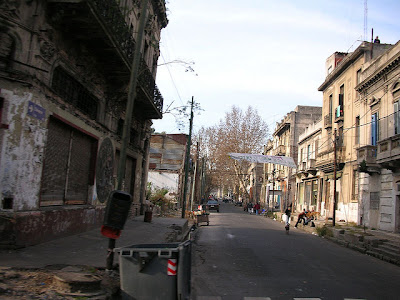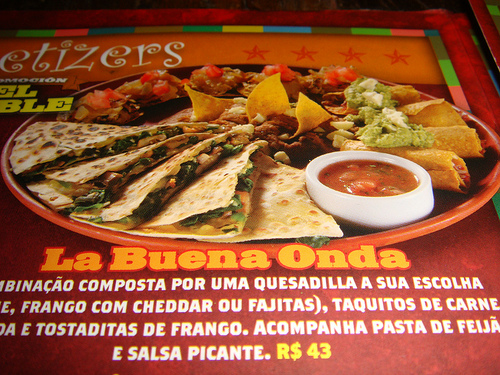Boludo
 |
| Unless you mean to insult, use boludo only with someone this close, if you must Photo credit: Alberto licensed CC BY 2.0 |
Obviously, this wretch was popularly thought of as someone having a lot of guts to step into what’s practically a suicide mission. Lot of guts translated into big balls or, in Spanish, boludo. So, basically, the term would stand for someone brave and courageous and thus has “big balls.” But then, another school of thought noted them as utter fools as there was no bravery involved in certain death. Hence, with time, this word came to carry this connotation.
Although, in the streets of Argentina, a boludo would generally be an immature jackass or a moron, it might not always be as offending as it seems. Most teenagers are often heard using this word amongst themselves as casual appelative. It often combines with che in one of the most common street expressions, “¡Che boludo!” This could mean, “Hey moron!” or “Hey buddy!” depending on the context.
At any cost, stay away from using this word unless you are in extremely casual and friendly settings as you never know how it might come across. Especially if you’re older than, say 30, an overuse of boludo might be taken as an attempt to play up a certain image or even cultural or lexical poverty. And if you’re feeling even more adventurous, there’s pelotudo; same meaning but a much bigger punch.
By the way, this word refers to a wealthy person in El Salvador! So, be careful if you’re traveling to both the countries.
Quilombo
 |
| Slums of La Boca: ¡Qué quilombo! Photo credit: Richie Diesterheft licensed CC BY 2.0 |
Due to the miserable state of affairs in these settlements, the word came to be colloquially used for the whorehouses of Buenos Aires – and sometimes also Chile, Paraguay, Uruguay, and rest of Argentina – which were equally wretched if not more. With time, though, it has further evolved and generalized to cover any similar situation. So, basically, a quilombo today is a mess or any messed-up situation regardless of the context.
How intense is the connotation? Let’s just say it’s a tad stronger than “mess” but a touch gentler than something like a “shit storm.” Anyway, cutting through all its interpretations, at heart, quilombo remains something raucous, miserable, and downright bad.
Needless to say, you’d be better off limiting this word’s usage to only the most casual of contexts as it’s not a terribly sophisticated expression. Typical usage would be:
¡Qué quilombo! (What a bloody mess!)
Se armo un quilombo (It was a freakin’ mess)
¡Tu casa es un quilombo! (Your house is such a mess!)
Onda
 |
| Everything nice is buena onda! Photo credit: Claudia_midori licensed CC BY 2.0 |
Using la onda in isolation simply means cool or good – a tad stronger than bueno. Although there are many phrases using this word, it’s not uncommon to hear it being used on its own in an expression. One example is, ¿Qué onda?
Well, this is quite a handy word due to its versatility and ubiquity, at least in Mexican and Rioplatense dialects of Spanish. The most common expression using this word is ¿Qué onda? which means, “What’s up?” Here, the question essentially meant to be asked is more like, “What’s making waves?” or “What’s going on?”
Other than the extremely common expression mentioned above, the word finds usage in quite a few other contexts as well. Some of the most common expressions use onda along with buena or mala, in the phrases, buena onda (good intention/faith/mood) or mala onda (bad faith/intention/mood). Whether onda indicates nature, mood or intention, depends on the preposition attached to it:
en buena/mala onda (with or in a good/bad intention)
de buena/mala onda (in a good/bad mood)
buena/mala onda (cool/mean or a good/bad thing or situation)
Let’s review some examples:
Mi jefe es muy buena onda (My boss is pretty cool)
La música de esa banda es la onda (This band’s music is the best)
Lupe es mala onda (Lupe is quite mean)
Ahora, estoy de mala onda (I’m in a bad mood right now)
Las mujeres hablan en mala onda de Juan (The women talk harshly about Juan)
Pedo
 |
| These Argentineans are definitely en pedo Photo credit: Leonardo Daniel licensed CC BY 2.0 |
Another interesting phrase involving pedo is vivir en nube de pedos. If you abide by the literal translation, this would conjure up a rather disgusting image of someone living in a cloud made of farts. But in colloquial speech, this simply refers to someone living in a dream-world, totally detached from reality. Interesting?
The play with words doesn’t stop here. Ever seen a scuba diver slowly ascending back to the surface after a long session? It’s no mean feat to push through the immense pressure of all the water on top of your head, especially when you have gone too deep. Now imagine that diver letting out a fart so strong that it propels him to the surface in one loud jet! There’s an expression for this vision in Spanish – Subir como pedo de buzo – which literally means, “to climb like a scuba diver’s fart.” Well, the image might not be pleasant but the expression is quite handy in a lot of contexts. Essentially it relates to someone “rapidly climbing up the social ladder.”
Of course, these are not the only words that define Argentinean Spanish and you’ll discover many more as you start conversing with the locals. But, these are by far the most prevalent expressions you are likely to encounter on a stroll down the alleys and streets of this country. Just try avoiding their usage in formal settings and you should be just fine. And if, by any chance, you’ve been there and done that, please feel free to share your experiences. Any words or expressions you feel should make the list of Argentinean slang keywords? Share them!



.png)
Great article! Only a doubt: by "peludo" in the "Boludo" section, do you mean "pelotudo"?
ReplyDeleteThe alternative for boludo is "pelotudo" and not "peludo". ;) cause it means "con pelotas", "pelotas" being a sinonym of "bolas" as in "pelota de fútbol".
ReplyDeleteIt's "pelotudo"...you're absolutely right.
ReplyDeleteReaders like you make Always Spanish rock! Thanks for pointing out the typo, Juan. Corrected it now. :)
ReplyDeleteAs Juan says, "pelotudo" is a derivative of "pelota" which, in turn, is synonymous to "bola", the Spanish for "ball". Thanks for noting the typo, Doris. :)
ReplyDeleteWell, "pedo" gets even more used:
ReplyDeleteal pedo - lazing around, idle.
Juan está al pedo en su casa - Juan is at home doing nothing.
It also means "useless" when applied to activities and objects:
Es al pedo ir al gimnasio una semana si después no vas más - there's no point in going to the gym one week if you don't keep going afterwards.
de pedo - with tons of luck, against highly unfavourable odds.
Conseguimos las entradas para el show de pedo, ya casi no quedaban - We had lots of luck getting the tickets, the show was almost sold-out.
You're right. "Estar al pedo" can almost be seen as "farting around" or "doing nothing productive."
ReplyDeleteSimilarly, "ser pedo" can be seen as "being useless or pointless." Pedo is quite versatile that way!
Hi! Great article! :) I would like to just make a few small corrections... When you are talking about the word "onda", we do not use the expression "estoy de mala onda", or "hablan en mala onda". It sounds more mexican to me...
ReplyDeleteWe also do not refer to something as "es la onda" (like in the case of a band). What we would usually say in that situation is "Esa banda es la bomba", or "Esa banda es una masa".
Nevertheless, as I said before, really great and interesting article!
Really? I do admit the Mexican authority over "onda" but since my input came from a friend living in Argentina for over a decade now, I took it as a Mexican import to the country that has probably assimilated to a very high degree. Just as despite being American by origin, the word, "cell phone," is used as widely (if not more) in Europe as "mobile".
ReplyDeleteSo, where do we stand with "onda"? Is it completely alien outside of Bs. As.? My friend uses it in quite annoying frequencies!
Also, if you're from Argentina, how about helping us out with some more words that could qualify as the "most overheard" in the streets out there? It would be a great learning experience for not just me but this whole community of eager and open minded learners. :)
ReplyDeleteWow! I just fell in love with boludo! Quite a handy little word! :)
ReplyDeleteYou're right, we DO use the word "onda" quite a lot! But not in the specific collocations that I mentioned before. We do say "mala onda", "¡Qué buena onda!", or "¿Qué onda? (I use that last one very much!) and it can get really annoying and repetitive as you said :)
ReplyDeleteWe tend to (over)use one pet phrase that I find really funny and I really don't know why do we use it or where did it come from! When we are talking to a friend about, for example, a conversation we had with another person, we say "Agarra y me dice..." (Literal translation being: "He holds and says..." Awkward, right??
Hehehe...that (agarra me dice) DID sound a tads funny and I admit I have never heard it either. But I'm curious for sure to learn its usage better if it warrants attention. Thanks for your inputs! :)
ReplyDeleteYou're very welcome! I just thought of another one haha. We use the word "posta" very much as well...
ReplyDeleteAs an affirmative sentence, we use it to establish that something is true and that you wish that the other person believes you. For ex, "Ayer me quedé re dormido, posta" ("Re", another word that is worth a place in our hearts. If you don't know it, I will be happy to explain it!)
And, as a question, when we are surprised about something, we usually say "¿Posta?", or the more super-informal-Argentinean-way: "Naaaa, ¿Posta?" That "naaaa" is really accurate ahaha, and we tend to say it pretty loud. We are really weird, I know :)
I read your profile here and saw you are in love with Spanish. I can really feel related to you because the same happens to me but with English! :)
Feel free to help me and our community with your Spanish and we'd love to help you with anything to do with English. Synergy at its best ;)
ReplyDeleteSo, I gather "posta" is in some ways the Argentinean equivalent of the English expression, "really!" said with an eager pitch. And of course, we'd love to learn more about this, "re" thingy, not to mention the examples on "agarra me dice".
Thanks again for taking time to explore this site and my profile :)
Examples on "Agarra y me dice", here we go:
ReplyDeleteA: -María estaba re enojada, imaginate que agarra y me dice que soy un irresponsable
B: -¡No puede ser! ¿Qué le dijiste vos?
A: -Agarro y le digo que es una pelotuda, obvio.
As I forgot to tell you, the "agarra y me dice" comes in different tenses as well!
And "re" is, I believe, the slang or informal word we use the most ("che" being a close second.) The thing is we use it THAT much that we don't even realize it. In some way, it would be sort of an equivalent to "very" or "really", but much more informal, and we can use it before any adjective we can think of (also used before verbs, and sometimes nouns, but that is a little bit more complicated to explain). Examples: "Esta página está re buena", "Me re resbalé", "Me re gusta esta canción", "Me re hago pis" (Or very informal "Me re meo")
Thank you for the wonderful new perspective, Flor. I guess your inputs call for a cover of their own and I should be doing one pretty soon. Quite some food for thought indeed!
ReplyDeleteCan you please do a post on Puerto Rican Spanish? I'll be visiting San Juan with my girlfriend next month and want to be as prepared for the culture shock as I can!
ReplyDeleteI am looking forward to doing one and would certainly do it in some time. For how, however, I guess you can either wait or visit a page that's way more informative when it comes to colloquialism than I can ever get. It's by a man called Jared and his wife, Diana, who have spent decades learning and discussing slang from all over Latin America! The site is http://www.speakinglatino.com. Don't forget to download one of their slang e-dictionaries...they are really exhaustive for all appetites.
ReplyDeleteHehehe...boludo is handy I totally agree. Only if you're careful not to use it with strangers or those not too close. You could end up sounding "over-friendly" in a bad way. ;)
ReplyDeleteI have always assumed that the origin of "re" was "realmente" (really, truly, positively, etc.) and over the years it became shorter and shorter until now it is common to say "re." I have no actual linguistic evidence to support that theory but it makes sense if you substitute "realmente" for "re" in sentences.
ReplyDeleteThat would be another way to look and certainly seems just as natural...maybe even more so. Thanks for the input, Krotor.
ReplyDeleteWhat about pelotudo?
ReplyDeletewww.goodairlanguage.com
I did have to laugh a bit at the picture used for "pedo", since those are Mexicans "en pedo" and not Argentineans. The "Tecate" beer is one hint, and the Coahuila license plates in all the other pictures is the other major hint ;)
ReplyDelete